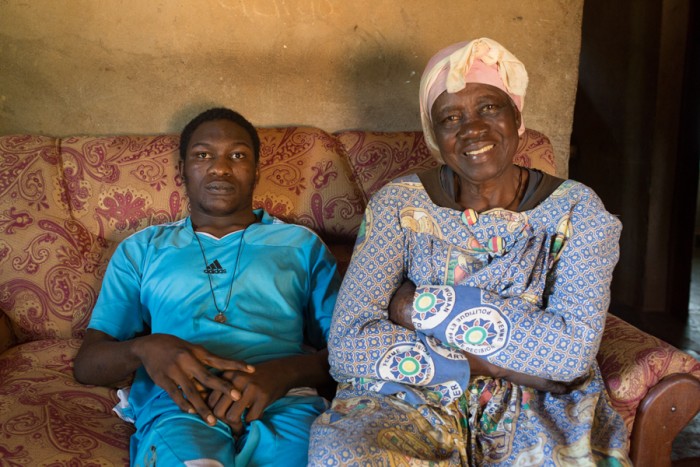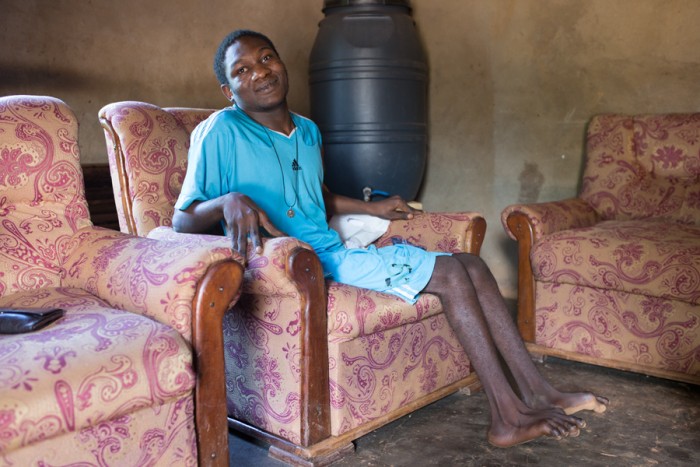September 3rd, 2016 by Rachel | Tags: Disability, Peace Corps, Persons with Disabilities of Cameroon, Photography | No Comments »
During the last seven months of my Peace Corps service, I am featuring photographs and stories of several persons with disabilities living in Cameroon. All the photos are part of a series called “Persons with Disabilities of Cameroon.” The goal of presenting photographs and their stories is to create better awareness about the plights that persons with disabilities face in a developing country. When I return to the US, I hope to exhibit this series in a gallery and publish a book to educate others about persons with disabilities living in developing countries as this topic is so rarely discussed in the media.
“I was born with some disability caused by nature,” said Innocence. Based on seeing Innocence’s body and how his grandmother described his body, it appears that he may have cerebral palsy.
“In my hands at the hospital, he was very healthy and so we had taken him home from the hospital. We came back to the house. When I went to wash the body, I feel the bone lines. I see the folds of the legs and arms. After four months, he could not sit fine,” said his grandmother, Francisca.
“He was like this,” the grandmother leaned her back to the right. She then demonstrated her legs going straight and outwards.
“So I came back to the hospital. And the doctor advised for him to excise his legs. So I came back to the house and I would do exercise. At 8 months, he was crippling with his stomach,” the grandmother leaned down on her back to demonstrate how her son was crippling with his stomach.
“I took him to SAJOCAH (St. Joseph Children and Adult Home). So he was not sick. I took him to SAJOCAH for exercises. I would take him at 10 o’clock every morning for exercise. I was paying money. So I last for two years. There were no changes. So I could not pay. I came back to the house, and I took him to the hospital for more exercise. I was paying money to the hospital for more exercise. So I would do the exercise in the house. I went to do operation in Njinikom. He was operated on the upper part of the legs. So we stayed in Njinikom for three weeks. And came back to the house. That was all. He was 12 years,” said his grandmother.

Innocence with his grandmother, Francisca
“Did the operation help?” I asked.
“No,” she said.
I asked Innocence, “Did you go to school?”
“No. I’ve never seen the four walls of a classroom,” he said.
“What did you do growing up?” I asked.
“Growing up, I did nothing. I lived around the concession,” he said.
“The catholic priest from Futru Parish near here came here and introduced me to a volunteer from Spain and gave me lessons. He taught me how to write letters and to read. Unfortunately he left and went back to Spain. Since then I have not received any lessons,” he added. The volunteer from Spain was with him for only one or two years. He was 15 years old when the volunteer visited him. He is now 22 years old. He currently has two volunteers who visit him to teach him how to read and write. They have been visiting him since this January 2016.
“What are your biggest difficulties,” I asked.
“As you can see, I can’t take a bath. Somebody has to wash me,” he said.
His grandmother chimed in and said, “He cannot walk. He needs someone to carry him. He has no wheelchair. He cannot do anything himself. I take care of him. I cannot carry him out. If he wants to go to toilet but I cannot carry him at all. I have a bucket in the house and bring it to him. I suffer a lot because of him. I cannot go to the market or go far because I have to take care of him. I work nothing because of him.”
She has a small farm by the house and gets food from around the house.
Innocence’s father died six months after he was born. His mother was a student when he was born and gave the baby to the grandmother.

